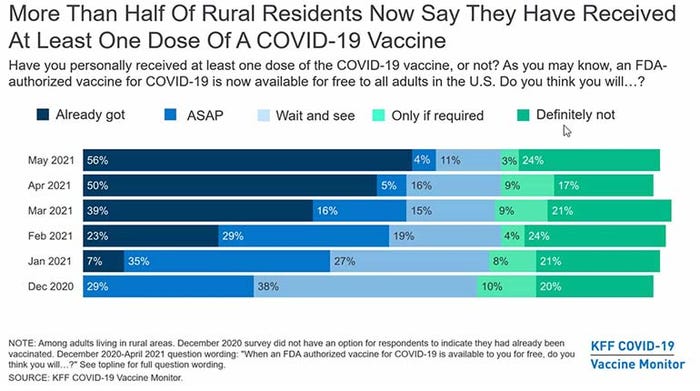
Hundreds of business, agricultural, municipal and public health leaders convened June 3 for a National Rural Business Summit to explore ways to build vaccine confidence and improve access in rural communities. A new coalition was formed to strengthen vaccine uptake in rural America combining the efforts of the Health Action Alliance, COVID Collaborative, Ad Council, the American Farm Bureau Federation, Center for Rural Strategies, Rural America Chamber of Commerce, National League of Cities, the National Rural Health Association and The Daily Yonder to increase understanding and acceptance of the COVID vaccine.
The most recent data from the U.S. Centers for Disease Control and Prevention revealed that COVID-19 vaccine coverage was significantly lower in rural counties (38.9%) compared to urban areas (45.7%); those disparities persisted across age groups and by sex. And, as rates of vaccination have slowed across the country, the gap between rural and urban areas has grown wider.
Approximately 60 million persons in the United States live in rural counties, representing almost one fifth of the population.
According to new data from the Kaiser Family Foundation, one in ten (11%) rural residents is still adopting a “wait and see” approach to getting vaccinated, and nearly a quarter of rural Americans (24%) say they would “definitely not” get a COVID-19 vaccine.
Speaking at the summit, Mollyann Brodie, executive vice president and COO of Kaiser Family Foundation, shares that top concerns from rural residents include being required to get vaccinated when they don’t want to and possible side effects. There are also concerns about if vaccination is offered at a location or by those they trust.

Vaccination concerns vary
Secretary of Agriculture Tom Vilsack notes, “We recognize there are multiple reasons why folks may be reluctant to get vaccinated. That needs to be acknowledged, and that needs to be respected. But it’s important to do what we can to educate individuals about the importance of getting vaccinated."
Information from trusted voices—including employers—can help build vaccine confidence and improve vaccine access in America’s heartland. The coalition is encouraging those in rural America to listen with empathy to better understand rural American’s questions or concerns about vaccination.
More than half of rural residents who are in the “wait and see” group say they would be more likely to get vaccinated after hearing that the vaccines are nearly 100% effective at preventing hospitalization and death from COVID-19 or hearing that scientists have been working on the technology used in the new COVID-19 vaccines for 20 years.
Dirk Kempthorne, COVID Collaborative co-chair and former governor of Idaho, notes, as leaders in rural America, discussion should focus on vaccine confidence instead of vaccine hesitancy. Leaders and employers can encourage additional vaccination by sharing why the vaccine is safe.
“There is not one silver bullet to share with one target audience that will change the course of the vaccination effort,” Kempthorne says. “We have to meet people where they are, with the information they need. And while each effort might only encourage a small group of people to get vaccinated, overall it matters a lot.”
Employees role in encouraging vaccination
As National Rural Health Association CEO Alan Morgan explains during the summit, “Last year we saw more rural hospitals close than at any point in the last two decades. In rural communities, we're talking about two issues: an access issue and a communications issue."
Businesses can make it easier for rural workers by offering internet access to schedule vaccine appointments, or by offering transportation, food or modest financial incentives to encourage vaccination.
Rural employers can also consider workplace or mobile vaccine clinics and partnerships with local Cooperative Extension System field offices to help improve vaccine access for workers and their families.
Asking questions is good
The National Rural Health Association released a concise, rural-focused toolkit to help rural community leaders engage their communities in vaccine conversations. And, the Ad Council has launched a comprehensive new communications and messaging toolkit full of resources created specifically for rural communities to meet residents where they are, giving equal access to information so everyone can have the facts and decide for themselves whether getting vaccinated is right for them.
As part of the coalition’s efforts, the “It’s Up to You” is a public education campaign with the goal of providing the latest information to help people make informed decisions. The campaign drives to www.GetVaccineAnswers.org which houses the latest information from the CDC and other leading health experts. Everyone deserves access to the most up to date information so they can make their own decision about the vaccines.
Vilsack also shares if people want to find out more about vaccination locations to call 1-800-232-0233 or text your zip code to 438829.
Read more about:
Covid 19About the Author(s)
You May Also Like






